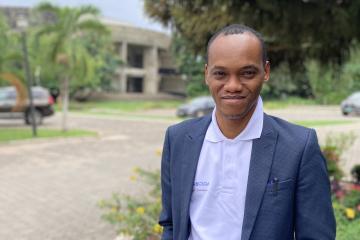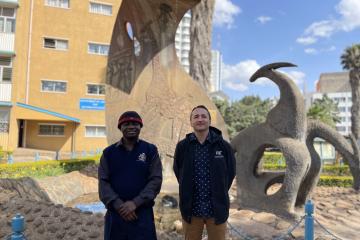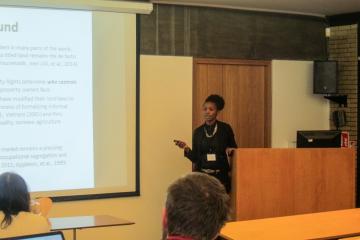
African Scholar Spotlight: Mohammed Tanko

This post is part of our ongoing series showcasing the work and perspectives of economists from the African continent who are leading randomized evaluations. Through our African Scholars Program, we hope to help create more opportunities for African researchers to advance the research agenda on the continent through randomized evaluations. In this spotlight, we speak with Mohammed Tanko from the University for Development Studies.
What drew you into the field of development economics and, in particular, working with impact evaluations?
During my undergraduate studies, I developed a passion for economics with the aspiration of contributing to the development of low- and middle-income countries. My exposure to economics provided me with a strong foundation in integrated development studies. In addition to theoretical knowledge, I gained practical field experience by working in rural communities, where I saw firsthand the importance of economic development.
Governments and NGOs implement numerous projects and programs aimed at improving living standards, but as an economist, I often ask myself: Do these projects impact the target groups? This question motivated me to engage in evaluating such programs, starting with the Ghanaian government’s flagship “Planting for Food and Jobs” initiative in 2017, the findings of which were published in 2019.
What are your broad research interests?
Although I collaborate with professionals from various fields, my primary interest lies in applying economic principles and theories to agriculture, education, health, and sanitation.
What are you using J-PAL initiative funds to do? What research question are you trying to answer, and how does it relate to your context?
My team evaluated the effectiveness of using drones for delivering vaccines to farmers, thereby enhancing livestock productivity, funded by the Digital Agricultural Innovations and Services Initiative. Additionally, we investigated the impact of providing potable water through a digital system with support from the Digital Identification and Finance Initiative, with the goal of improving health outcomes, empowering women, and raising living standards. Currently, we are piloting a girls’ mentorship program in Northern Ghana, funded by the Learning for All Initiative.
The funds we received were used for data collection activities, including training field officers, programming research instruments, transportation costs, accommodation costs, and compensating enumerators and supervisors. Some funds were also allocated for incentives for respondents, covering salaries for investigators and research assistants. In addition, a portion—typically 10 to 15 percent—was directed toward fringe benefits for the university.
Since many of our studies are pilots, we are particularly focused on answering key questions, such as:
- What factors influence participation in the program?
- Are there gaps in the initial program design?
- What can be done to improve the overall impact?
Given the cultural and social differences across regions, these questions are crucial for ensuring that programs achieve their intended objectives.
What do you see as the big unanswered research questions in your context that randomized evaluations may be able to help answer? Does this relate to any projects you are excited to work on in the future?
Potentially using a randomized evaluation to measure the impact of the Ghanaian government’s free senior high school (SHS) policy, which was introduced to reduce the financial burden on parents and make high school education more affordable. Despite the policy, many parents continue to face challenges with costs related to supplementary activities, such as extra classes, especially because students now have a longer holiday. I am excited to explore research questions related to this in the future, including:
- Does the free SHS policy improve academic performance at the senior high school level?
- Does it improve the welfare of parents?
- What impact does the policy have on job opportunities for SHS graduates?
Additionally, we are piloting an evaluation on a girls' mentorship program in Northern Ghana to explore its influence on the academic, social, and emotional development of girls, particularly within the context of the region's cultural norms.
How has the support you’ve received from J-PAL assisted you in your career? How can organizations like J-PAL continue to build support for local researchers running randomized evaluations?
The support I have received through J-PAL has helped me acquire knowledge on impact evaluations through training, workshops, and mentorships. These opportunities equipped me with the skills to design randomized evaluations and write strong research proposals. This support has also improved my teaching and supervision in impact evaluation courses.
Data collection and analysis have become more efficient with J-PAL’s support, and the insights gained contribute to my research efforts and the broader literature.
To continue building support for local researchers, J-PAL could showcase success stories in its calls for proposals, establish more local offices, and collaborate further with universities and research institutions to offer short-term courses to postgraduate students.
Do you have advice for young aspiring African scholars thinking about a career in economic research?
My advice to young, aspiring economists is this: don’t give up when you encounter failure. Treat failure as an opportunity to grow. Develop a passion for quantitative analysis if you want to conduct economic research. Explore the world, collaborate with others, build networks, attend economic conferences and workshops, and be innovative in your writing.
What advice would you give to scholars considering applying to J-PAL for funding?
Becoming a J-PAL Scholar requires hard work and dedication. Subscribe to J-PAL’s newsletters, follow their social media, visit the website regularly, attend webinars, read the relevant materials, and participate in training and workshops. Make sure you meet the eligibility criteria before applying. Get in touch with J-PAL affiliated professors for guidance and support, and don’t hesitate to contact the J-PAL support team for information before, during, and after your funding application.
If your project requires an implementing partner, clearly explain the research to the potential partner, outlining what J-PAL funds can and cannot cover, and highlight the importance of their contribution to the success of the research.
What were some of the key mistakes you made in your early applications?
In my early applications, I made several mistakes. I did not attend any webinars to fully understand the initiative’s requirements, and I rushed into the application process with a mentor who was unfamiliar with the J-PAL model. We applied for a full-scale RCT without realizing we first needed to complete a pilot before we could apply for full-scale RCT funding.
In another instance, we didn’t secure approval from an implementing partner, which meant we couldn’t proceed with the pilot study as we did not have a letter of support. Additionally, we attempted to evaluate a government project without having enough information about it, only to discover that it had already been fully implemented, leaving us without a control group.
What surprised you the most about how the funding process works?
The most surprising aspect of the funding process is how smoothly it operates once an invoice is submitted for payment. Once your part of the contract is fulfilled, J-PAL will take care of their part.


